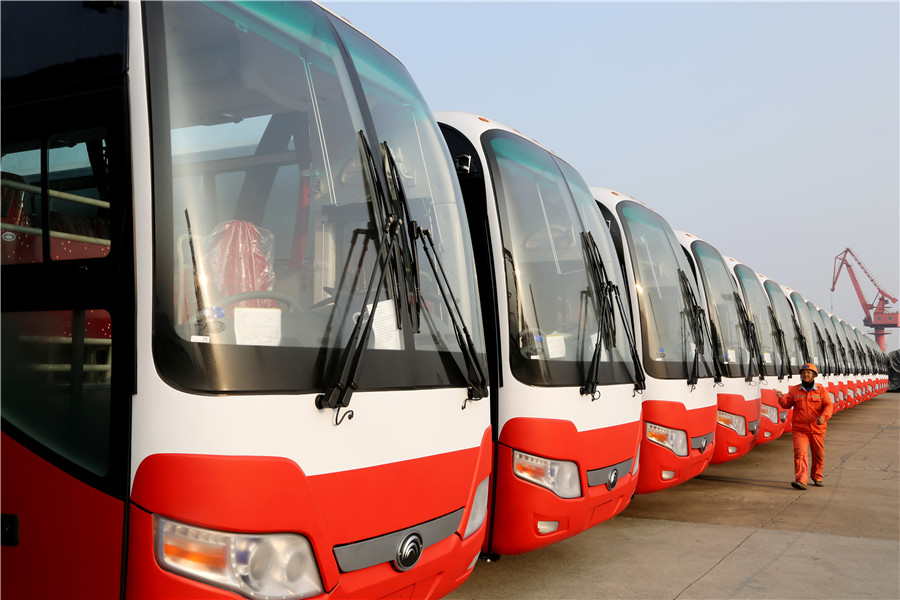
A Yutong employee inspects an array of buses, which are to be shipped abroad, at a dock in Lianyungang, Jiangsu province. [Photo by Wang Chun/For China Daily]
MONTEVIDEO - In southern Uruguay's Canelones department, or province/state, a leading transport company is relying on Chinese technology to renovate and upgrade its bus fleet.
With the help of Chinese bus manufacturer Yutong and its hybrid vehicles, the Pando Omnibus Company SA, which is known as Copsa, is looking to modernize its service.
"After a period of economic difficulty, we began a fleet renovation plan that we had postponed for four years," Copsa General Manager Javier Cardoso said.
As part of the plan, Uruguay's top transportation firm unveiled 10 Yutong buses in February, all ZK 6108 models.
"It is a model that has given us very good results" and "its price is comparatively lower than a similar Brazilian product with the same features", said Cardoso.
Along with pricing and features, Yutong's maintenance and repair costs were key factors affecting the Uruguayan firm's selection.
"It's a very comfortable ride. The buses are spacious for both getting on and getting off," said student Diego Gonzalez, 25, who takes the buses for his daily commute.
Pablo Sosa, 42, said the buses "drive very well. You can tell it has an automatic gear shift, something that is still not common here".
Yutong's representative in Uruguay, Alvaro Gorriz, who is a manager at transport service Buses del Sur (Southern Buses), said the Chinese company's ZK 6108 model has evolved notably.
The units are equipped with a six-cylinder Cummins engine, Allison automatic transmission and gear shift, and Michelin aluminum wheels and tires, according to Gorriz.
These features have improved the day-to-day operations for drivers in a "radical way", Gorriz said.
"All of that at a standard price that makes the buses no less than 20 to 25 percent cheaper than the market rate, and (compared) to vehicles that are not as well-equipped."
Founded in 1930, Copsa sells some 3 million tickets a month for routes that connect Canelones, Uruguay's second most populated department, with the capital Montevideo.
Copsa also covers routes to Maldonado, home to Uruguay's top beach resort of Punta del Este.
Copsa is considering incorporating Yutong's hybrid buses, which run on a combination of fuel and electricity, into its renovated fleet.
"We are studying the hybrid bus, we believe the product is viable for several of the routes," said Cardoso, adding the move could be made later this year.
If Copsa does acquire a Yutong hybrid bus, it won't be the country's first transport company to do so.
A Montevideo-based urban transit firm, Cooperativa de Obreros y Empleados del Transporte Colectivo, launched a pilot project in August last year to try out Yutong's ZK 6125 CHEVG diesel-electric hybrid model, the first of its kind in Uruguay.
But hybrids are still a costly option for the South American country, according to Gorriz.
"The hybrid will be the option in 10 years", depending on the evolution and price tag of electric vehicles, said Gorriz.
"Technology is moving forward by leaps and bounds in the electric field, and what is available today is obsolete in a year or two. So it wouldn't be a good investment in the immediate term," he said.
Since 2016, Montevideo transport firm Compania Uruguaya de Transportes Colectivos SA has put a K9-model electric bus made by Chinese electric-vehicle giant BYD in circulation. At least 24 BYD electric taxis are also in service.
The first Yutong brand buses began circulating in Uruguay in 2007. Currently, 420 such units ferry passengers around the country for a variety of companies, including Corporacion Omnibus Micro Este, Casanova and Compania de Omnibus de Rivera, according to Gorriz.
But there is plenty of room in the Uruguayan market.
Gorriz plans to travel to China this month to secure better financing terms for Yutong clients in Uruguay, which are looking to renew their fleets.
"Right now, our customers have a two-year financing for 70 percent of the product. We want to extend it to five years. We have several orders that call for some 150 units," said Gorriz. (From China Daily)
